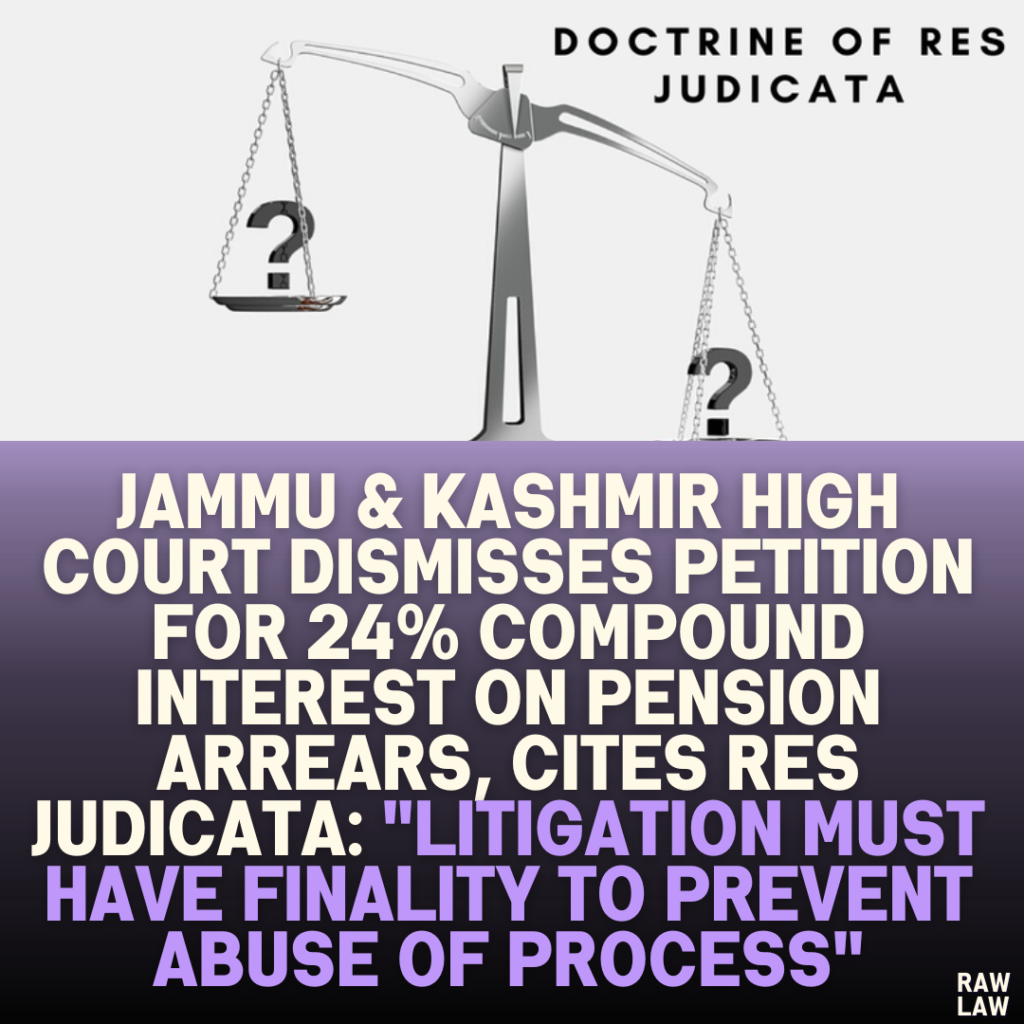Court’s Decision
The Jammu & Kashmir High Court dismissed the writ petition filed by the petitioner. The court ruled that:
- The reliefs sought—compound interest at 24% per annum on delayed pension arrears and compensation of ₹10,00,000—were already covered in an earlier writ petition.
- The petitioner could not file a fresh writ petition seeking the same reliefs, as doing so was barred by res judicata.
The court emphasized that the earlier judgment had provided some relief, but the petitioner failed to challenge the denial of additional claims, and thus could not reopen the matter.
Facts
- The petitioner’s husband passed away on June 3, 2008, making the petitioner and her family eligible for family pension and related benefits.
- Family pension was sanctioned in March 2009 (P.P. No. 001100900087), but no disbursal occurred until May 2014.
- The petitioner filed a writ petition (SWP No. 705/2014), which led to the release of pension arrears from June 2008 to May 2014, but without interest.
- Dissatisfied, the petitioner filed the present writ petition, seeking:
- 24% compound interest on the arrears until full disbursal in October 2015.
- ₹10,00,000 compensation for mental agony, undue delay, and social exploitation caused by the delayed payments.
Issues
The court identified the following key issues:
- Is the petitioner entitled to compound interest at 24% on delayed arrears of family pension?
- Can the petitioner claim compensation for the alleged social and financial hardships caused by the delay?
- Does the doctrine of res judicata bar the present writ petition?
Petitioner’s Arguments
The petitioner contended that:
- The delay in disbursal of family pension arrears caused significant mental distress, financial hardship, and social exploitation.
- The respondents had acted negligently by withholding pension payments for over six years.
- The petitioner was entitled to compound interest at 24% for the delayed payment, as well as compensation for the undue harassment faced during this period.
Respondent’s Arguments
The respondents argued that:
- The petitioner’s reliefs were already addressed in the earlier writ petition (SWP No. 705/2014), where the court granted 8% interest on the arrears.
- The principle of res judicata bars filing a fresh writ petition on the same issue. The petitioner should have appealed the earlier decision if dissatisfied.
- The delay in disbursal was due to the non-availability of the banker’s copy of the pension payment order, which was eventually resolved.
Analysis of the Law
- The court referred to Section 11 of the Code of Civil Procedure (CPC), which codifies the principle of res judicata, preventing re-litigation of issues already decided or capable of being raised in earlier proceedings.
- It emphasized that the principle applies universally, including to writ petitions, as established in M. Nagabhushana v. State of Karnataka (2011) 3 SCC 408.
- The court highlighted the public policy rationale of res judicata:
- It ensures finality of litigation.
- It prevents repeated vexation of parties.
- It maintains the integrity of judicial proceedings by avoiding abuse of process.
Precedent Analysis
The court heavily relied on M. Nagabhushana v. State of Karnataka, where the Supreme Court ruled:
- Repeated suits or petitions for the same cause of action violate principles of res judicata.
- Litigants must seek all reliefs in the initial proceeding and cannot file fresh cases on the same grounds to reopen settled matters.
- Allowing such actions would lead to endless litigation, defeating the purpose of justice.
Court’s Reasoning
- The court noted that the petitioner had already sought similar reliefs in the earlier writ petition, SWP No. 705/2014.
- In that case, the court directed the bank to pay arrears with admissible interest (calculated at 8%) and provided no further relief.
- The petitioner failed to appeal the earlier decision and instead filed a fresh writ petition, which the court found to be barred by res judicata.
- The court also noted that the bank complied with the earlier order by disbursing arrears with 8% interest, as per prevailing rates.
Conclusion
The court dismissed the writ petition, concluding that:
- The reliefs sought were barred by res judicata, as they were already addressed or could have been addressed in the earlier petition.
- The petitioner should have appealed the earlier decision if dissatisfied, rather than filing a fresh petition.
Implications
- This judgment reinforces the principle that litigation must have finality, discouraging repeated attempts to seek relief for the same cause of action.
- It emphasizes the importance of raising all claims in the initial litigation and using proper appellate mechanisms to challenge unfavorable rulings.
- It clarifies that admissible interest rates, rather than arbitrary rates claimed by litigants, govern delayed pension disbursals in similar cases.
